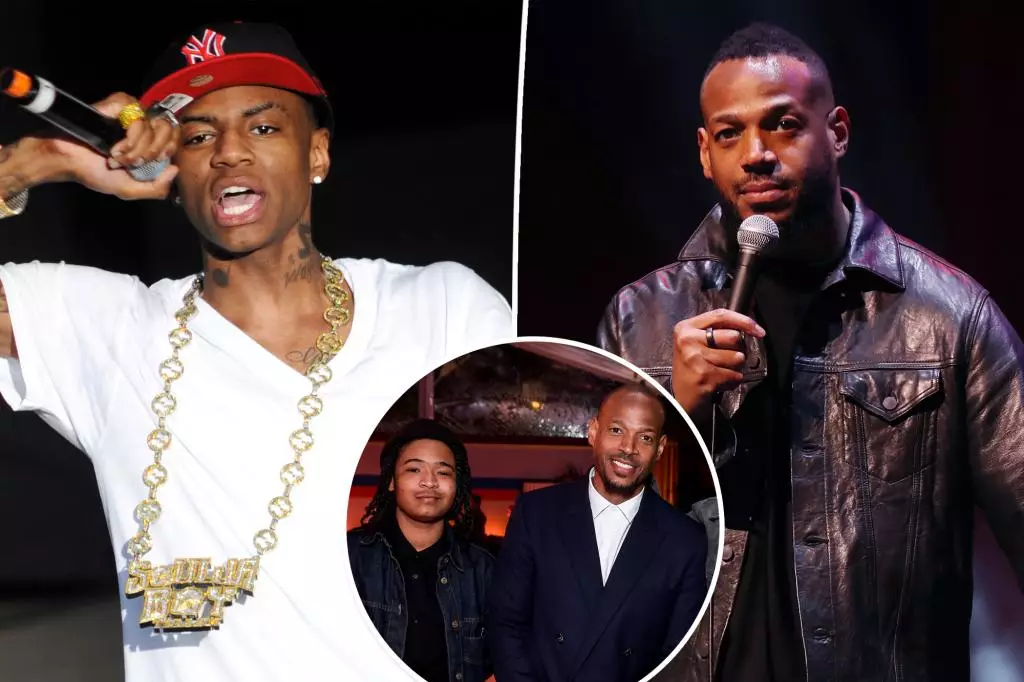In the world of celebrity culture, public feuds are not uncommon. They often serve as a backdrop for entertainment, drama, and, more importantly, social commentary. Recently, Marlon Wayans found himself in the midst of a heated exchange with rapper Soulja Boy, which escalated following derogatory remarks made about Wayans’ child. The incident sheds light on how celebrity interactions can reflect broader societal issues, particularly concerning respect, acceptance, and the treatment of the LGBTQ+ community.
The feud ignited when Soulja Boy made a crude remark about Wayans’ transgender son, which prompted a strong response from the actor and comedian. Wayans, known for his openness and candor, did not hesitate to assert himself, indicating that Soulja Boy’s relevance in the entertainment industry has dwindled since 2007. By using social media to address the derogatory comment, Wayans aimed not only to defend his child but to highlight the absurdity of Soulja Boy’s previous career successes versus his current attempts to gain attention through controversy.
Wayans has publicly supported his son Kai’s transition, showcasing a journey that many parents struggle with when their children come out. The comedian shared his experience of initially feeling resistant but ultimately reaching a place of unconditional love and acceptance. His authenticity is commendable and sets a powerful example for other parents navigating similar situations. The importance of supporting one’s children is underscored in Wayans’ narrative, where love triumphs over ignorance.
His posts during Pride Month further cement his advocacy for the LGBTQ+ community, creating visibility for both his son and others who may feel marginalized. By openly proclaiming his support on social media, Wayans contributed to a growing narrative that challenges societal norms regarding gender identity and family dynamics. In doing so, he advocates for understanding and acceptance against the backdrop of hostility and ignorance exemplified by Soulja Boy’s comments.
Social media has transformed the landscape of celebrity interactions, providing platforms for immediate response, outrage, or camaraderie. In this case, both Wayans and Soulja Boy engaged in a war of words through platforms like X (formerly Twitter). This digital playground allows for a rapid-fire exchange of insults, jokes, and commentary, transcending traditional media’s slower response times.
Wayans’ ability to handle the situation with humor, even when discussing the serious issue of his child’s identity, creates a unique dynamic. Instead of solely engaging in a tit-for-tat exchange, he employs comedy as a tool for resilience in the face of bigotry. By downplaying Soulja Boy’s attempts at contention, he not only retains his dignity but also elevates the conversation into a realm where laughter can be a powerful antidote to hatred.
At the heart of this feud lies a commentary on relevance in the entertainment industry. Soulja Boy, once a pioneer of viral music hits like “Crank That,” represents a phase in music that has since evolved. His attempts to recapture past glory through controversy rather than artistry might explain his desperate need for attention. In contrast, Wayans remains a figure of adaptability, successfully navigating different facets of the entertainment landscape over his long career.
Wayans’ jabs at Soulja Boy’s lack of hits were not merely insults; they underscore a deeper narrative about what it takes to sustain a career in entertainment. As he quipped about needing a “chest” to engage in a beef and compared Soulja Boy to a “wet muppet,” it illustrated a point about substance over style. In the age of instant fame and fleeting relevance, it’s a stark reminder that talent and genuine artistry often outweigh shock value.
The exchange between Marlon Wayans and Soulja Boy serves as a microcosm of larger societal issues, particularly surrounding acceptance, identity, and the nature of celebrity culture. Wayans’ advocacy for his son stands in stark contrast to the degrading remarks of Soulja Boy, who attempts to leverage controversy for attention.
Ultimately, this feud not only highlights the dynamics of celebrity interactions but also prompts reflections on how society treats diverse identities. Public personalities like Wayans can help normalize acceptance and love, fostering a culture where individuals feel supported in their authenticity. The ongoing dialogue inspired by such events emphasizes the need for compassion and understanding in the face of hostility, paving the way for a more inclusive future.


Leave a Reply